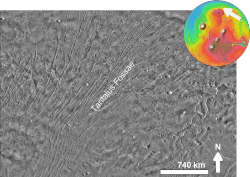Tantalus Fossae
|
Tantalus Fossae based on THEMIS day-time image | |
| Coordinates | 50°54′N 97°30′W / 50.9°N 97.5°WCoordinates: 50°54′N 97°30′W / 50.9°N 97.5°W |
|---|---|
Tantalus Fossae is a group of troughs in the Arcadia quadrangle of Mars, located at 50.9° north latitude and 97.5° west longitude. They are about 2,400 km long and was named after an albedo feature at 35N, 110W.[1] Troughs, like this one are called Fossae on Mars. More information and more examples can be found at Fossa (geology).
Dust devil tracks
Many areas on Mars experience the passage of giant dust devils. A thin coating of fine bright dust covers most of the Martian surface. When a dust devil goes by it blows away the dust coating and exposes the underlying dark surface. Dust devils have been seen from the ground and from high overhead from orbit. They have even blown the dust off of the solar panels of the two Rovers on Mars, thereby greatly extending their lives.[2] The twin Rovers were designed to last for three months, instead they have lasted more than five years and are still going. The pattern of the tracks have been shown to change every few months.[3] The image below from HiRISE shows some dust devil tracks in the shape of X's. You may need to click on the image for a larger view to see the tracks clearly.
- Tantalus Fossae, as seen by HiRISE. Click on image to see dust devil tracks.
References
| Wikimedia Commons has media related to Tantalus Fossae. |
- ↑ "Planetary Names: Welcome". Planetarynames.wr.usgs.gov. Retrieved 2012-10-28.
- ↑ "Mars Exploration Rover Mission: Press Release Images: Spirit". Marsrovers.jpl.nasa.gov. Retrieved 2012-10-28.
- ↑ NASA's Mars Exploration Program archived 28 October 2011 from the original
